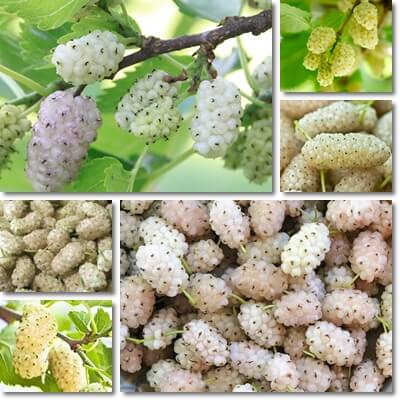White mulberries are in full season right now and one of the best summer foods to eat. A forage fruit par excellence, white mulberries are 100% organic and count as clean food.
Not just this, but the newly rediscovered fruit is a functional food with surprising benefits for health. You get good amounts of iron and vitamin C from white mulberries, as well as vitamins B2, E and K.
White mulberries boost energy levels and vitality and have antianemia activity.
They exert mild blood pressure lowering benefits and contribute to good bone density. Constituents occurring naturally in the fruit have scientifically proven antidiabetic activity and measurable anti-obesity and anticancer properties.

What are white mulberries?
White mulberry is a name used to denominate both mulberry fruit that are white in color and the species of common mulberry tree also known as the white mulberry which produces white, red and black fruit. White mulberries are forage fruit, but edible to humans and perfectly safe to eat raw, dried and cooked. Not even unripe mulberries are dangerous for health, only unpalatable and a source of digestive upset. White mulberries have a wonderful sweet taste with a straightforward flavor that lacks acidity.
What are the benefits of white mulberries?
Lower high blood pressure numbers
White mulberries have mild antihypertensive benefits and make a good food to eat for high blood pressure. The blood pressure lowering benefits of white mulberries are owed to the fruit’s content of magnesium and potassium and specific polysaccharides.
Magnesium and potassium in white mulberries induce vasodilation and vasorelaxation which result in lowering blood pressure numbers. Magnesium further acts on the nervous system exerting a mild sedative effect which is conducive to relaxation and counteracts the hypertensive effects of stress and agitation.
Another way white mulberries lower blood pressure numbers is via special polysaccharides (essentially carbohydrates).
Animal studies have identified polysaccharides in white mulberries ‘induced endothelium-dependent relaxation in rat mesenteric arteries’. The polysaccharides were found to trigger the production of nitric oxide in endothelial cells lining the inside of blood vessels.
Nitric oxide is a gas and cell signaling molecule with a variety of functions in the human body. Increased production of nitric oxide induces relaxation and dilation of blood vessels which relieves the pressure exerted by blood against blood vessel walls. This results in a drop in blood pressure and antihypertensive benefits.

One of the few 100% organic foods
Clean eating is the foundation of good health. White mulberries are the epitome of clean food as they are a food product obtained without human intervention, sourced almost entirely from the wild from naturally occurring trees. Mulberries themselves require no special care and do no need chemical treatment with pesticides making them a 100% organic food.
Good for high cholesterol
Eating white mulberries can help with high cholesterol. The fruits have a good content of dietary fiber and are naturally low in calories (only 43 kcal or kilocalories per 100 grams of fruit). Including them in your diet can help with weight management and favor weight loss which can improve cardiovascular health parameters such as cholesterol levels and profile.
White mulberry fruit are also high in antioxidants with anti-hyperlipidemic and anti-atherogenic activity, helping lower blood lipid levels and prevent plaque deposits on the inside of artery walls (source).
Exert antidiabetic benefits
One of the biggest benefits of white mulberries is their antidiabetic action. Despite having a honey sweet taste, white mulberries are a low glycemic food with a glycemic index of less than 50 on the glycemic index scale. That means white mulberries have a limited glycemic impact and will not cause spikes in blood sugar levels, when consumed reasonably, making them a good food to eat for diabetes.
In part, the antidiabetic benefits of the fruit are a result of a limited content of carbs and a good content of dietary fiber that slows down the absorption of sugar into the bloodstream for better blood sugar control.
Furthermore, studies show biologically active antioxidants in white mulberries exert antidiabetic benefits in the form of an antihyperglycemic action supported by anti-obesity activities. The antihyperglycemic activity is owed to the inhibition of alpha-glucosidase which slows down digestion of carbohydrates and lowers the rate of sugar absorption into the bloodstream, with added benefits for insulin sensitivity.

Help you lose weight
If you are looking to lose weight, then a diet low in calories is the solution. But the types of foods you choose to eat can determine how well, how much and how fast you lose excess weight, and white mulberries are a good food to consider for a weight loss diet. For one, they are low in calories.
How many calories in white mulberries? There are around 43 kcal (kilocalories, calories) in 100 grams of fresh, ripe white mulberries. Eating foods low in calories helps you achieve a calorie deficit that is conducive to weight loss.
At the same time, white mulberries are extremely sweet and are great for curbing sweet cravings – they can successfully substitute calorie-packed processed desserts in a weight loss diet and prevent binge eating as a result of cravings all the while supporting the weight loss process. The dietary fiber content of the fruit further contributes to satiation and prevents overeating.
Studies have shown white mulberries have important anti-obesity effects. For one, the fruit are low glycemic and demonstrate antihyperglycemic effects which favor a healthy blood sugar profile and provide metabolic benefits that counteract weight gain and support weight loss.
Bioactive antioxidants in the fruit delay carbohydrate digestion for a more controlled rise in blood sugar levels and improve insulin sensitivity, representing an adjuvant in weight loss and weight management.
Contribute to bowel health
White mulberries are a food with natural prebiotic effects. Dietary fiber and fermenting sugar alcohols in the fresh ripe fruit nourish good gut microflora and support healthy populations of beneficial microorganisms. A healthy bowel ecosystem is conducive to bowel health.
Relieve constipation naturally
Eating white mulberries is good for relieving constipation. A good source of dietary fiber, the fresh fruit add bulk to stools which stimulates contractions of the intestinal tract that move food along, encouraging more regular bowel movements that are also easy to pass. Sugar alcohols in white mulberries ferment and exert a prebiotic action that translates into mild laxative benefits.
Anti-anemia benefits
Lack of iron in the diet causes iron deficiency anemia. Iron is involved in the production of red blood cells and hemoglobin needed to transport oxygen to tissues. A deficiency causes fatigue, muscle weakness, malaise and lethargy. White mulberries have a good content of iron to correct low levels and boost energy and vitality. The fruit is also high in vitamin C which optimizes iron absorption.
Good for hair loss due to anemia
One of the side effects of anemia is hair loss. Thinning hair and hair loss occur due to impaired red blood cell and hemoglobin production which causes a failure to properly oxygenate and nourish scalp tissue and hair. White mulberries provide iron for red blood cell and hemoglobin production which helps correct anemia and stimulate hair growth, as well as good amounts of vitamin C to boost absorption of iron.
Anti-bleeding and anti-clotting action
White mulberries have a good content of both vitamin K and vitamin C. Vitamin K in the fruit has clotting effects, supporting blood clotting processes with the purpose of preventing blood loss from wounds. Conversely, vitamin C exerts an anti-clotting action, dissolving blood clots to prevent cardiovascular events. Both nutrients are needed in the diet in sufficient amounts for good health.
Lower inflammation levels in the body
The anti-inflammatory benefits of white mulberries are owed to flavonoids and other antioxidants, but also vitamin C. Vitamin C in particular has been shown to lower levels of several inflammation markers in the body (e.g. C-reactive protein, interleukin-6) and actively and measurably reduce inflammation levels and associated risks for health.
Anti-aging properties
White mulberries are a food with antiaging properties. They are rich in antioxidants which scavenge free radicals and limit and repair cell damage caused by oxidative stress. Vitamin E in the white fruit also exerts antioxidant effects at cell level, while vitamin C stimulates the production of collagen in the skin for better skin elasticity and improved appearance of wrinkles.
Minor benefits for wound healing
White mulberries help with wound healing thanks to a good content of vitamin C. Vitamin C stimulates the synthesis of collagen in the skin, providing material for wound repair. It exerts anti-inflammatory properties and an antimicrobial action that prevent infection and hurry healing. Not just this, but the vitamin has a direct reparative action: it stimulates skin tissue regeneration by supporting inactive skin cells divide and differentiate, contributing to the renewal of damaged skin tissue.
Anticancer properties
Despite dark colored foods being preferred for their antioxidant content, white foods such as white mulberries are just as important sources of antioxidants. White mulberries have vitamin C, iron, vitamin E, flavonoids and various other antioxidant constituents with anti-proliferative, tumor-suppressing, apoptosis-inducing and detoxifying effects.
Minor benefits for teeth and bones
Eating white mulberries is good for your teeth and bones. For one, the fruit provide small amounts of calcium, magnesium, phosphorus and potassium which get absorbed into bone and contribute to the strength and rigidity of bone tissue.
In addition to building bone tissue with minerals, white mulberries have good amounts of vitamin C to regulate the maturation and functions of cells that grow new bone, and vitamin K needed to synthesize enzymes that regulate bone metabolism for good bone density. Vitamin C in white mulberries further contributes to capillary strength, helping gums stay attached to teeth which keeps teeth in place prevents tooth loss.
Protective effects for the liver and kidneys
White mulberries come with a surprising range of benefits for health, including hepatoprotection and renoprotection. Studies show consumption of white mulberry fruit, and also leaves, exerts a protective effect on the liver and kidneys. The benefits are owed to highly biologically active polysaccharides (source 1, source 2).
